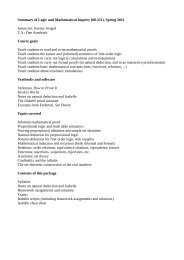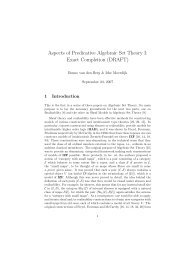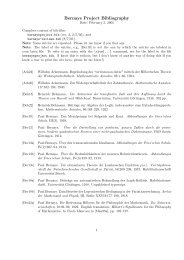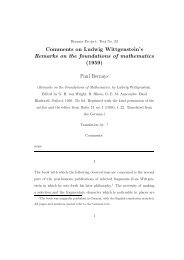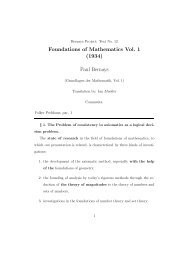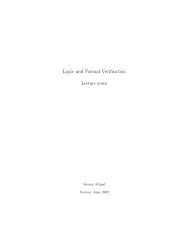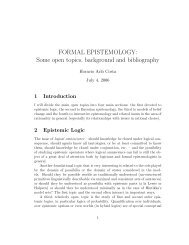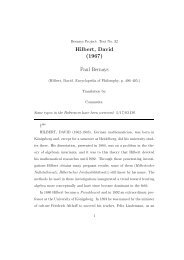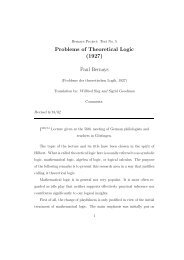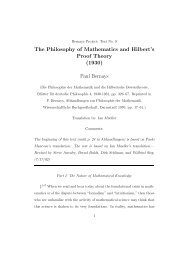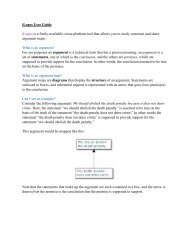Platonism in mathematics (1935) Paul Bernays - Phil Cmu
Platonism in mathematics (1935) Paul Bernays - Phil Cmu
Platonism in mathematics (1935) Paul Bernays - Phil Cmu
You also want an ePaper? Increase the reach of your titles
YUMPU automatically turns print PDFs into web optimized ePapers that Google loves.
We have set forth only a restricted platonism which does not claim to<br />
be more than, so to speak, an ideal projection of a doma<strong>in</strong> of thought. But<br />
the matter has not rested there. Several mathematicians and philosophers<br />
<strong>in</strong>terpret the methods of platonism <strong>in</strong> the sense of conceptual realism, pos-<br />
tulat<strong>in</strong>g the existence of a world of ideal objects conta<strong>in</strong><strong>in</strong>g all the objects<br />
and relations of <strong>mathematics</strong>. It is this absolute platonism which has been<br />
shown untenable by the ant<strong>in</strong>omies, particularly by those surround<strong>in</strong>g the<br />
Russell-Zermelo paradox.<br />
If one hears them for the first time, these paradoxes <strong>in</strong> their purely logical<br />
form can seem to be plays on words without serious significance. Nonetheless<br />
one must consider that these abbreviated forms of the paradoxes are obta<strong>in</strong>ed<br />
by follow<strong>in</strong>g out the consequences of the various requirements of absolute<br />
platonism.<br />
The essential importance of these ant<strong>in</strong>omies is to br<strong>in</strong>g out the impos-<br />
sibility of comb<strong>in</strong><strong>in</strong>g the follow<strong>in</strong>g two th<strong>in</strong>gs: the idea of the totality of all<br />
mathematical objects and the general concepts of set and function; for the<br />
totality itself would form a doma<strong>in</strong> of elements for sets, and arguments and<br />
values for functions. We must therefore give up absolute platonism. But it<br />
must be observed that this is almost the only <strong>in</strong>junction which follows from<br />
the paradoxes. Some will th<strong>in</strong>k that this is regrettable, s<strong>in</strong>ce the paradoxes<br />
are appealed to on every side. But avoid<strong>in</strong>g the paradoxes does not consti-<br />
tute a univocal program. In particular, restricted platonism is not touched<br />
at all by the ant<strong>in</strong>omies.<br />
Still, the critique of the foundations of analysis receives new impetus<br />
from this source, and among the different possible ways of escap<strong>in</strong>g from the<br />
6



